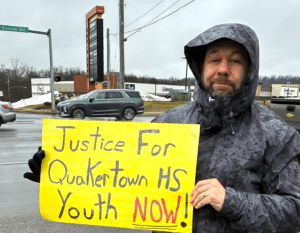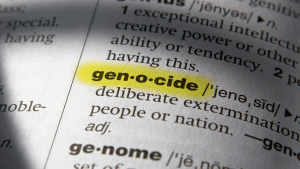Bucks County’s got some alarming statistics to deal with of late. Teen pregnancy and STD rates complicate the lives of young people in the region.
According to the Bucks County Department of Health, the number of young people infected with Chlamydia and Gonorrhea has skyrocketed and is climbing. Sharita Flaherty, HIV/STD Program Manager for the Bucks County Department of Health (BCDH) released numbers citing 326 cases of chlamydia or gonorrhea in young people aged 15 to 19 in 2022, alone. While the exact numbers are not yet available, Flaherty cites an increase in 2023, as well.
Additionally, the teen pregnancy rate is nearly 25 percent higher than the national average.
While no single cause for Bucks County’s (and Pennsylvania as a whole) higher numbers of reproductive healthcare issues has been pinpointed, one thing is for sure – teen pregnancy and sexually transmitted disease rates aren’t being caused by Comprehensive Sex Education courses. In fact, part of the problem may be that Pennsylvania does not mandate sex education classes in the schools at all. Moreso, recent attempts to limit discussion of sexuality in schools coincides with the increases in STDs – including Central Bucks School District efforts in early 2022 to eliminate discussion of “human development and sex education in the schools.”
And while no legislation in the Pennsylvania Senate is currently proposed to improve public school access to reproductive healthcare instruction, two bills were presented this biennium that would address the broader issues of consent and protection from abuse.
Senate Bills 293 and 388, both co-sponsored by Bucks County State Senator Steve Santarsiero, aim to increase information delivered to teens at school. SB293 requires Pennsylvania schools to teach children – grades kindergarten through twelfth – about consent.
Lead sponsor, Democratic State Senator Timothy Kearney from Delaware County, supports teaching consent at an early age as a way for children to develop necessary mechanisms for adulthood.
“When children understand the concept of consent at an earlier age, they will be better prepared to understand when their personal boundaries are being violated, and report to trusted adults when they have been harmed,” said Kearney. “When teenagers have incorporated consent into their instincts, they will be more confident navigating intimate relationships, including saying no to unwanted advances and recognizing when someone is trying to take advantage of them.”
Last June, at the Moms for Liberty Joyful Warriors Summit, Kelly Schenkoske, lectured conference goers that teaching consent would be harmful to children – insisting that the very notion of consent implied teens had a choice when it comes to sexual activity – and that they should only be taught to say “no.”
Kearney’s bill stresses the opposite: “Lack of consent in relationships, resulting in date rape and other forms of sexual assault, is a frequent and serious problem today and by starting young and teaching consent as a fundamental value in human interaction, we will develop and strengthen the importance of this value in adolescence and adulthood.”
The BCDH supports an abstinence message as part of the overall messaging. “BCDH takes an abstinence-based approach to HIV/STD prevention, that is, abstinence is a tool, in the same toolbox as condoms and PrEP, that an individual can choose to use any time.” To support safe measures, the BCDH provides free STD testing and supplies condoms which are available by contacting their office.
READ: At The Moms For Liberty Summit, Comprehensive Sexual Education Is CRT And Sexualization Of Children
The second bill, SB388, proposed by Berks County Democratic State Senator Judith Schwank, mandates reporting sexual violence in the schools. While neither SB388 nor SB293 speaks directly to educating young people about reproductive healthcare they both amend the Pennsylvania Public School Code of 1949 which provides the current guidelines for sex education in public schools. Now in effect for its 75th year, the Public School code mandates comprehensive and necessary healthcare guidelines for children – including access to diabetes testing equipment and in-school visits with dentists – but it provides zero information on reproductive health.
According to Sexual Information and Education Council of the United States (SIECUS), Pennsylvania’ public schools mandates provide that “if” sex ed is taught in schools – it “must stress abstinence… and must publicize the fact that parents or guardians can review all curriculum materials and may excuse their children from the programs.” Conversely, schools are not required to provide, “education on sexual orientation or gender identity, or consent.” Additionally, schools don’t have to reference any scientific data, “Pennsylvania has no regulation regarding medically accurate sex education instruction.”
Director of Education for Planned Parenthood Keystone, Amber Brown, is concerned that without scientifically accurate instruction, young people may learn things that could hurt them. Additionally, teaching heteronormative classes may leave some students in the dark about potentially risky behavior, “Much of the sex ed that is taught [in Pennsylvania] ignores LGBTQ issues resulting in some young people tuning it out because they think it doesn’t apply to them.”
But, according to the American Academy of Pediatrics, there is a solution to Bucks County’s higher rates of teen pregnancy and sexually transmitted disease. Because, “developing a healthy sexuality is a core developmental milestone for child and adolescent health – youth who are exposed to comprehensive sex education programs in school demonstrate healthier sexual behaviors: Increased rates of contraception and condom use. Fewer unplanned pregnancies. Lower rates of STIs [sexually transmitted infections] and HIV [human immunodeficiency virus].”
While avoiding disease makes sense, the available statistics on teen pregnancy for the county didn’t come from the department of public health. They originated with the Bucks County Department of Workforce and Economic Development (WED). The Pennsylvania Workforce Innovation and Opportunity Act (WIOA) requires local workforce development boards to compile statistics and submit a four-year comprehensive plan to the governor.
At the beginning of the decade, WED submitted their report for the years 2021 thru 2024. The eighty-nine-page document contains data including a list of the fastest growing occupations in the county, the numbers of persons with disabilities and the types of disability, the level of incarceration and the number of persons re-entering society when their time is up. And, buried deep inside those and other statistics and predictions, was the teen pregnancy rate.
Planned Parenthood Keystone’s Amber Brown speculates that teen pregnancy is an important factor when considering the county’s overall economic impact, “The economic impact of teen pregnancy and rising STI rates includes increased healthcare costs, reduced educational and employment opportunities, and additional strain on social support systems.”
“The rise in teen pregnancy rates in Bucks County highlights the importance of tackling this issue with real, tested solutions,” Brown added. “Teens deserve honest sex education, access to contraception, and trusted adults they can turn to with questions about sex, relationships, and other big decisions. Planned Parenthood Keystone’s Education Department is committed to giving young folks the knowledge and support they need to handle these situations and make informed choices.”







